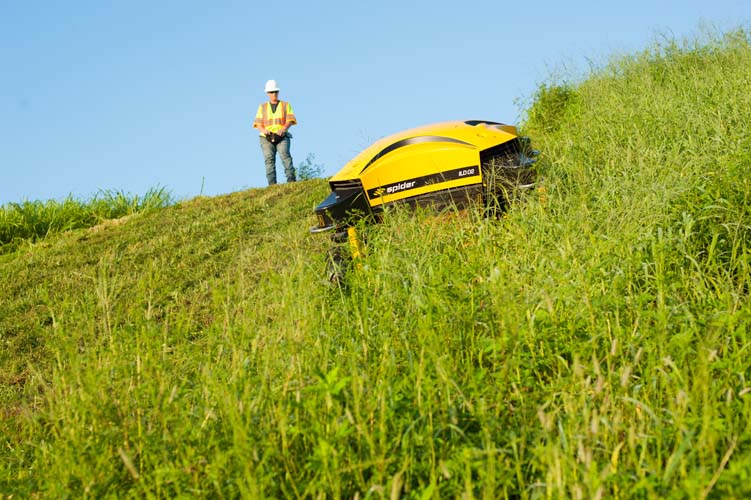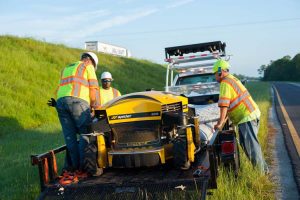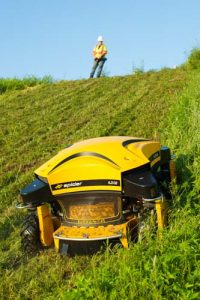
Beachsiders traveling the area’s major roads the past three months may have caught a glimpse of a new tool being used in the battle to keep Mother Nature at bay.
Prompting motorist double takes, a riderless, school-bus-yellow mower can be seen crawling up and down the overpass slopes of I-95 and S.R. 528 as well as state roads 401, 407 and 518 as it literally mows down all vegetative obstacles in its path.
 The 809-pound Spider is manufactured in the Czech Republic, and runs on 95 octane unleaded gas, with no additives, according to the operation manual. It’s one of six machines that Pennsylvania-based DBI Services recently bought to boost its safety and production rates as it maintains high-speed roadways throughout Florida.
The 809-pound Spider is manufactured in the Czech Republic, and runs on 95 octane unleaded gas, with no additives, according to the operation manual. It’s one of six machines that Pennsylvania-based DBI Services recently bought to boost its safety and production rates as it maintains high-speed roadways throughout Florida.
“One of the key reasons we bought and use these is our company is all about safety,” said Chris Thomas, project manager for the asset maintenance contractor for the Florida Department of Transportation. “With a Spider, you don’t have people weeding, tripping, falling down or getting heat exhaustion. It’s a major safety item for us,” he said.
The mower is operated by a crew member with a radio controller, who moves the mower from the bottom of the slope to the top in successive passes until the job is done. The broad, square machine has a winch on the front onto which a cable is attached. The other end of the cable is hooked to the guardrail on the overpass, providing the pulling power it needs to climb the steep grades.

William Harris, technician
“The operator stands at the top and he goes just so far, then he loosens the cable and moves it further down on the guardrail and he reattaches it and keeps going,” Thomas explained.
The model that DBI bought, the ILD02, has a 48½-inch cut and costs $35,000 apiece, said Richard Doan, sales manager at Slope Care in Orlando, the North American distributor for Dvorak, the Czech Republic-based manufacturer.
Doan said the mower was designed and first produced for the European market in 2002 and has been in the United States since 2007. They are hardly a common sight, though. “People don’t see them because they work in retention ponds and power plants and some other places where people just don’t wander,” Doan said. But with DBI’s recent acquisition of five of the robomowers, motorists are going to be seeing them much more frequently.
“I approached DBI a little over a year ago about trying it out. They said they would take a look at it; we did a demo for them and they liked it. But they still wanted to do research before they paid a lot of money for a mower, so it took a while. They’ve had it for a year and I guess they liked the results since they just bought the big lot of them,” he said.
DBI is a major contractor with FDOT. Along with the work in Brevard, it may be easier to list what they don’t maintain. “We have I-75 from the Georgia line all the way to Miami. We have I-4. The majority of it. The Ultimate I-4 expansion project splits it up. Then we have a Tampa project, we have a Fort Pierce project, Port Charlotte, Ocala, Putnam County. We have Duval County, we have Lake City, Belle Glade, Flagler County and Miami Dade,” Thomas said.
Doan said Slope Care was able to cut DBI a deal because of the bulk purchase, selling them for $25,000 each. An outlay of $125,000 seems hefty for something that cuts grass, but Florida can grow a jungle in no time flat. So mowing is serious business and doing it safely is even more serious.
“The main thing to stress about the mowers is safety,” he said. “Because you’re eliminating five or six or more people on a slope with weed whackers who are subject to getting hurt: Slipping, falling and rolling down the slope and into traffic,” Doan said.
“When we first started in July 1 of last year, the slopes were terrible. They were overgrown. We had eight people working at Eau Gallie Boulevard. In one week we had probably $4,800 in just labor costs,” Thomas said. So rolling out a $25,000, riderless vehicle is cost effective in the extreme, as it pays for itself in a matter of weeks. “It’s that easy,” he said, adding that a job that would take six workers eight to 10 hours to complete is finished in three to four hours with one Spider and two workers.
“What we’re doing now is going down the mainline, which is I-95. We have been on S.R. 528; eventually we’ll be on all the slopes,” Thomas said. He added that they expect to work in a never-ending cycle “because we know the grass is going to grow. We will be on the beachside, toward Port Canaveral. We already did George King Boulevard and Courtenay Parkway.
“I have 28 people working for me and I couldn’t ask for a better crew. It’s long hours, long days, hot days, but they care about what it looks like when we go through,” he said.
During an early morning demonstration last week at I-95 and S.R. 524, the Spider was unloaded from the bed of a pickup, fueled up and quickly on its way, dutifully following technician William Harris like a pet to the base of the slope. Harris played out the cable, strode to the top of the overpass and hooked it in. The Spider was ready to do the work of six men.
The machine’s operation is a little more sophisticated than a weed whacker’s and there is a bit of a learning curve. “It helps if you have a radio-control background,” said Brad Fender, a mechanic in DBI’s Melbourne office. “It has basic controls: forward and reverse. The other joystick controls the direction of the tires. They’ll rotate 360 degrees so once you get the basic controls down, it comes pretty easy after that,” Fender said.
As far as downsides go, “If there are any negatives, it’s people stopping on the ramps to watch it,” Thomas said with a smile.
Doan echoed that thought: “People are not used to seeing mowers run without somebody sitting on them. They just slam on their brakes and start looking.”



